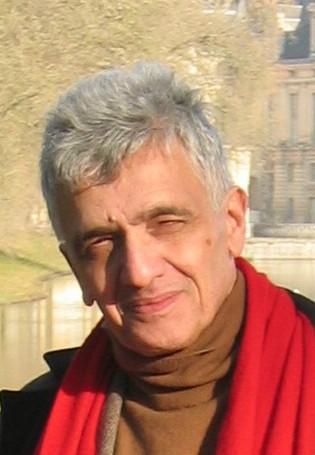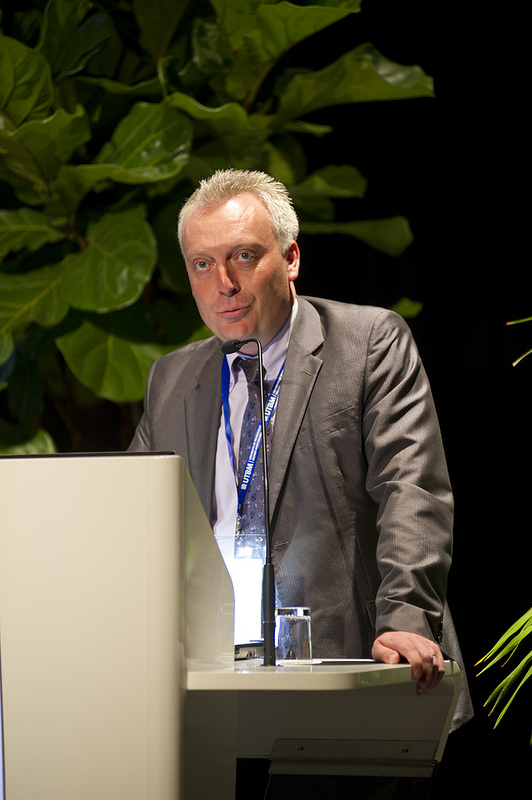Guest speakers
Plenary 1: Model-free control: towards a new paradigm in control engineering?.
Speaker: Professor Michel Fliess, LIX Laboratory, Ecole Polytechnique, France. michel.fliess@lix.polytechnique.fr

Abstract:
Writing down the equations describing a concrete plant is, as we
all know, almost always an impossible task. "Model-free control" and the
corresponding "intelligent" PID controllers (iPIDs) help to bypass this
step. The strange industrial ubiquity of classic PIDs and the great
difficulty for tuning them in complex situations is deduced perhaps for
the first time. Several numerical simulations are presented which include
some infinite-dimensional systems. They demonstrate not only the power of
our intelligent controllers but also the great simplicity for tuning them.
We conclude by listing the already numerous successful applications, which
were obtained in most diverse domains.
Biography: Michel Fliess developed several algebraic tools in control.
Let us mention here his discovery of "flat" nonlinear (joint work with J.
Lévine, P. Martin and P. Rouchon from the "Ecole des Mines de Paris")
which had and still has many industrial applications, and his quite recent
approach to estimation and parameter identification (joint work with H.
Sira-Ramirez from CINVESTAV (Mexico City) and C. Join from the "Université
de Lorraine"), which is more and more utilized all over the world.
He got several prizes from the French Academy of Sciences, from the CNRS,
and from the "Ecole polytechnique".
Plenary 2: A future for heat pumps? An analysis of the disparity between model-predicted and observed domestic heat pump behaviour.
Speaker: Professor Chris Underwood, Northumbria University, Newcastle upon Tyne, UK. chris.underwood@northumbria.ac.uk

Abstract:The initial field trial results of 82 domestic air- and ground-source heat pump installations in the UK by the Energy Saving Trust were damning. They reported average performances ('CoPs') of 2.15 for air source heat pumps and 2.34 for ground source heat pumps - well below expectations, and this has set back an expected rapid growth in the take-up of this technology by several years. The results were all the more unexpected since other evidence accumulated from laboratory-scale investigations and other field trials in continental Europe and the USA pointed to far better performances with the potential to delivery significant carbon emission reductions. The finger of blame has pointed in a number of directions but all that is clear is the that the reasons for the disappointing UK results are multi-faceted taking in manufacturing, design and maintenance issues. In this presentation, some of the EST data will be reviewed alongside both laboratory test data and manufacturers declared performance data both of which confirm a significant 'Performance Gap' between expected and actual performances. Reasons for this will be explored and measures to improve heat pump technology, installation design, and operating and maintenance procedures that might collectively close the Performance Gap of these systems will be suggested.
Biography: Chris Underwood is an internationally recognised expert on HVAC and urban renewable plant and controls. Author of 26 refereed journal papers, 19 international conference papers, one book and one book chapter since 2000. PI on 3 research grants (EPSRC/TSB) plus 17 industrial research and consultancy grants since 2000. Contributing author for the second edition of CIBSE AM11: Building Energy and Environmental Modelling. Holder of the CIBSE Dufton and Napier-Shaw medals for contributions to research and Editorial Board chairman of the Sage research journal Building Services Engineering Research & Technology.
Plenary 3: Future energy grids.
Speaker: Prof. Daniel HISSEL, Director, FCLAB Research Federation, Head of FEMTO-ST Energy / Hybrid & fuel cell systems research team (CNRS UMR 6174), University of Franche-Comte, France. daniel.hissel@univ-fcomte.fr

Abstract: Continuous depletion of the crude oil and gradual increase in the oil price have emphasized the need of a suitable alternative to our century-old oil-based economy. A clean and efficient power supply device based on a renewable energy source has to be available to face this issue. Among the different technological alternatives, fuel cell power generation becomes a more and more interesting and promising solution for both automotive industry and stationary power plants. However, many technological hurdles have still to be overcome before the development of industrial and competitive products in these fields. If fuel cell stacks are intrinsically able to respond quickly to the load changes, their balance of plant subsystems (hydrogen supply, air compressor, gas humidification, coolant circuit …) respond in times that are several orders of magnitude higher. This apparent contradiction diminishes the reliability and performance of the whole fuel cell system. Of course, considering the whole FC system, the gains in terms of both energy savings and pollutant emissions depend greatly on whether this whole fuel cell system is well designed or not and thus, whether global optimization has been performed on this system or not. Accordingly, a great number of technological challenges have to be solved before efficient, competitive, reliable fuel cell power generators can be actually seen on the market. This presentation will provide an overview about all this points, going from the technology to the applications.
Biography: Daniel Hissel obtained an electrical engineering degree from the Ecole Nationale Supérieure d’Ingénieurs Electriciens de Grenoble (France) in 1994. Then, he obtained a PhD from the Institut National Polytechnique de Toulouse (France) in 1998. From 1999 to 2000, he worked for ALSTOM Transport in Tarbes (France) where he was system engineer on electrical and fuel cell buses projects. From 2000 to 2006, he has been an Associate Professor at the University of Technology Belfort. From 2006 to 2008, he has been a Full Professor at the University of Franche-Comté and Head of the “Fuel Cell Systems” Research Team of the Laboratory of Electrical Engineering and Systems. In 2008, he joined the FEMTO-ST (CNRS) Institute and became Head of the “Energy systems modelling” research team. Since 2012, he is the Head of the “Hybrid & Fuel Cell Systems” research team in the same institute. His main research activities are concerning fuel cell systems dedicated to automotive and stationary applications, modelling, non linear control and energy optimization of these systems and fuel cell system diagnostic & prognostic. He was Associate Editor of IEEE Transactions on Industrial Electronics for 8 years and is Associate Editor of ASME Fuel Cell Science and Technology. He is also the President of the IEEE VTS French Chapter and member of the advisory board of the MEGEVH network, the French national network on EV and HEV. He is also currently the Director of the FCLAB (Fuel Cell Lab) Research Federation (CNRS), devoted to Fuel Cell Systems Research and gathering more than 100 researchers, and has published more than 320 scientific papers in peer-reviewed international journal and/or international conferences.









